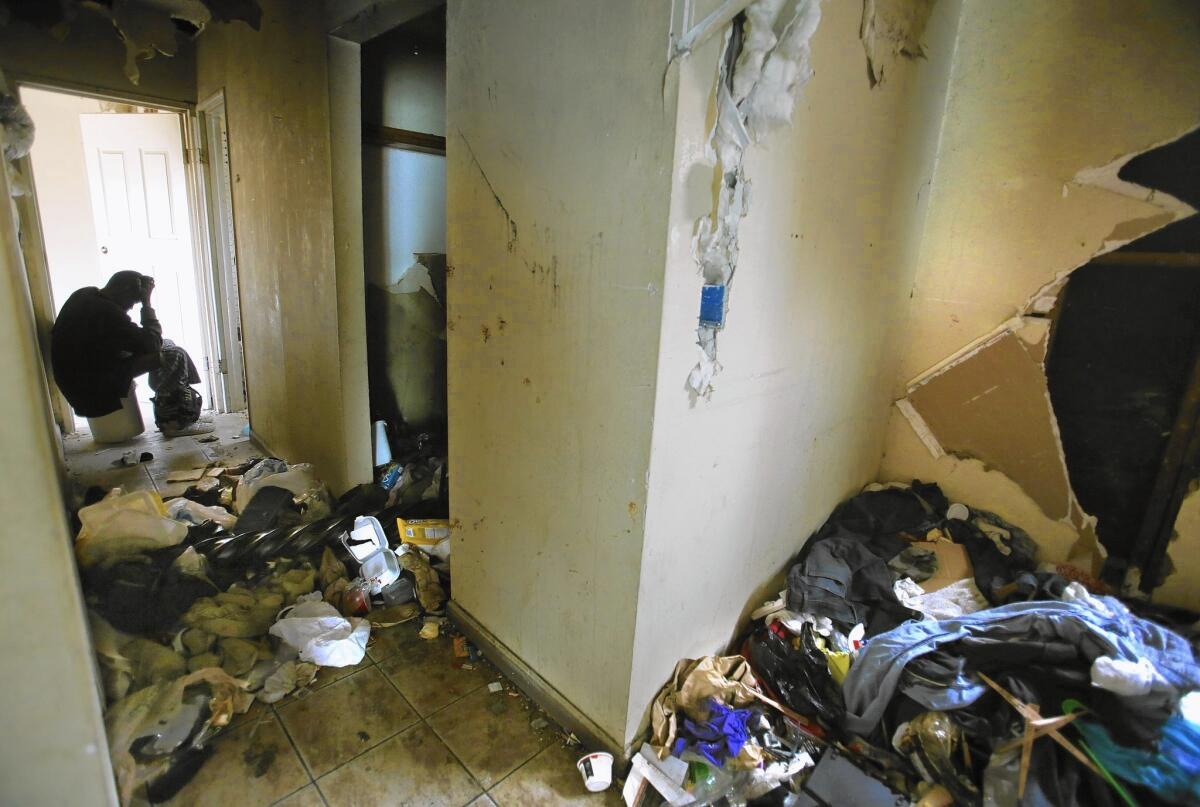L.A. City Council backs proposal to toughen foreclosure registry

Los Angeles is poised to tack a new fee on foreclosed properties, in a move that the city hopes will help keep the homes from turning into crumbling wrecks.
The City Council on Wednesday gave its initial approval to a measure that would toughen L.A.’s foreclosure registry program, which is designed to help city officials keep tabs on bank-owned vacant properties but which community groups and a city audit have said isn’t working.
The new measure, which passed unanimously in a preliminary vote, would place a $356 inspection fee on every bank-owned home in Los Angeles, enough to fund a once-a-year check of each house and to upgrade software so city departments can use the registry more effectively.
It’s a way to get a better handle on the thousands of foreclosed homes across Los Angeles, before they deteriorate and drag down neighboring properties, said City Council member Gil Cedillo, who is sponsoring the measure.
“We’re trying to make lemonade here,” Cedillo said. “We’re trying to take an incredible crisis and turn it into something better.”
More than 35,000 houses have been listed on the registry since it was launched last year, including more than 7,100 this year, with their owners paying a $150 registration fee and listing a local property manager to contact in case of problems. But the city’s Division of Building and Safety has said it barely uses the registry to track down owners of nuisance properties, and has no resources to proactively inspect foreclosures before they become problems.
A measure to improve the registry was first proposed in 2012 by then-City Council member, now-Mayor Eric Garcetti, but has sat dormant for nearly two years, in part because of lawsuits against a similar program in Chicago.
In May, City Controller Ron Galperin issued a highly critical audit of the registry — calling it “inherently flawed” — and urged improvements. Some community groups called for changes too, even staging well-publicized cleanups of a particularly dilapidated bank-owned house on 111th Street last spring to draw attention to the issue.
Beverly Roberts, a member of the Alliance of Californians for Community Empowerment, says she sees too many crumbling vacant properties in her South L.A. neighborhood. It’s time, Roberts said, for the banks that own them to be held accountable.
“You can see the weeds grown up and the house boarded up, and it looks like they should be getting ready to demolish it,” she said. “It makes our community look raggedy, and we’re tired of it.”
Business groups spoke up against the proposal Wednesday, saying that it was too broad and that it was penalizing any bank that owns a house regardless of the home’s condition.
“We all support reducing blight,” said Ruben Gonzalez, senior vice president at the L.A. Area Chamber of Commerce. “You’re simply punishing every lender whether they’re being good corporate citizen or not.”
Properties that are on the foreclosure registry are more than twice as likely as average to have a code enforcement complaint on record, according to a Los Angeles Times analysis of the registry and city building data. And since January, housing officials have found more than 1,600 houses that were in some stage of foreclosure but have not been registered, Helen Morales, a senior investigator with the city’s Housing and Community Investment Department, told the City Council on Wednesday.
The new fees — and a $250-per-day fine for failing to register — should help to end that, said City Council member Paul Krekorian, one of the measure’s co-sponsors.
“This is so long overdue,” he said. “I’m pleased we’re finally bringing this to the finish line.”
The City Council scheduled a final vote for Nov. 12. With no opposition from members so far, a spokesman for Cedillo said he was confident that the measure would pass.
Twitter: @bytimlogan
More to Read
Inside the business of entertainment
The Wide Shot brings you news, analysis and insights on everything from streaming wars to production — and what it all means for the future.
You may occasionally receive promotional content from the Los Angeles Times.











